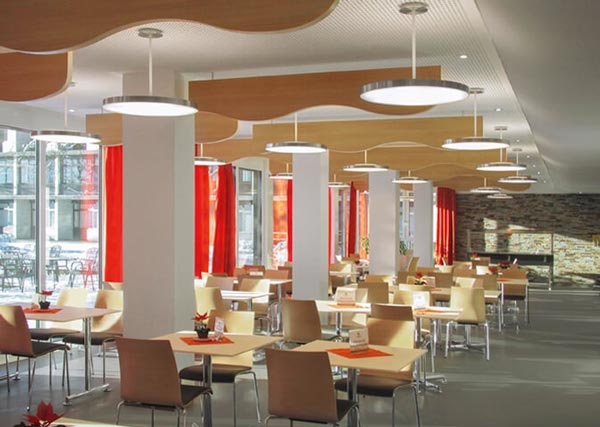I want good care
Alert residents and healthcare staff
Scientific research over the past 20 years has shown that many elderly people suffer from sleep and mood problems. Many elderly people in residential care complexes, retirement homes and nursing homes sleep badly and are constantly depressed. In addition, there are vision problems and even more than 50% of the elderly have glasses that are not at the right strength. We now know that a lack of sufficient (day) light is one of the causes of this problem.

Customers
With aging, and certainly in dementia, the brain slowly loses its ability to regulate the sleep/wake rhythm. A small area in the brain called the biological clock is responsible for this rhythm. The biological clock is connected to the outside world through the retina in the eye. With aging, the biological clock slowly loses its function because insufficient light stimuli are received by atrophy of nerve cells, optic nerves and the retina. As a result, the sleep/wake rhythm is slowly lost and people become increasingly disoriented and confused.
Many health and elderly care facilities appear to have lighting that no longer meets the demands and recommendations of modern times. This is unfortunate because it is now clear that lighting makes a valuable contribution to the well-being of the residents and also that of the staff. In recent years, FluxPlus has realized several dozen projects in which dynamic lighting has been developed that mimics daylight. This lighting is used in places where people stay for a longer period of time, such as in living rooms and corridors, but also in living/bedrooms and activity centers. In the other areas, normal lighting that is available in our range will suffice.

The products and services you can expect from us
- Information and advice
- Drawing up a functional and technical Program of Requirements PoR
- lighting design
- Biodynamic lighting systems
- Guidance of the installation work
- Developing lighting scenarios and programming the controls
- Knowledge transfer to staff and, if desired, to family and informal care
- Support for scientific research in collaboration with renowned colleges and universities.
Suitable lighting for the aging person
Most people prefer to continue living independently and unaided in their own environment as much as possible even in old age and when age-related disabilities present themselves. The requirements to be set for home furnishings, technical facilities, but certainly also for lighting, change significantly over the years. A lighting concept that is tailored to the specific needs of the elderly is one of the basic requirements for healthy, modern furnishing of old people’s centers, residential care combinations and nursing homes.
Good light in elderly care
• promotes freedom of movement for the elderly
• reduces the risk of accidents – fall prevention
• brings safety, security, homeliness and atmosphere
• offers exercise space and meeting points
• facilitates perception and orientation
• supports nursing and optimizes day-to-day operations
• reduces care through more independence
• gives structure to the day
• increases the quality of life for the elderly
• improves sleep and mood

More light for a better quality of life
light requirement
light-need
The aging eye needs 3 times as much light as a younger eye.
Fall prevention
Light is an essential aspect when it comes to safety. Good lighting makes it possible to see better and older people can continue to move for longer without restrictions.
Uncertainty and fear
Passing shadows or reflections are often the cause of irritation and uncertainty. Shade-warm and glare-free light has a positive effect on the perception of space.
Active participation in daily life should in principle be promoted, for example through better mobility and cognitive activities such as reading, crafts or crafts.
The benefits of light management
- The benefits of light management
- Lack of daylight is compensated, which can prevent the development of mood swings or even depression.
- Stabilization of the day and night rhythm through a light intensity and color that matches the time of day.
- Activation and promotion of rest phases by restoring the sleep/wake rhythm.
- increase in well-being; thanks to invigorating nights, the general condition improves both emotionally and physically.
- Giving sleep medication can be reduced in many cases.
Benefits for healthcare providers
- Clearly experienced added value through interior architectural measures, especially in the context of renovation projects, but also in new construction situations
- Measurable added value through reduction of absenteeism and absenteeism among staff, increased willingness to perform and motivation of staff.
- Economically efficient thanks to intelligent light management and more economical lamps.
- Clear signal operation; with regard to the complete, comprehensive care of the residents.
- A better reputation; of the institution by applying need-based lighting systems for the elderly, especially those suffering from dementia.
The added value of FluxPlus
FluxPlus has more than 25 years of experience in applying dynamic daylight facilities for health care and elderly care. The knowledge and experience of light expert Toine Schoutens guarantees professional lighting solutions, advice and guidance. We are happy to inform you about the possibilities and benefits for your residents and organization.
Interested? Feel free to contact us for information and advice.

